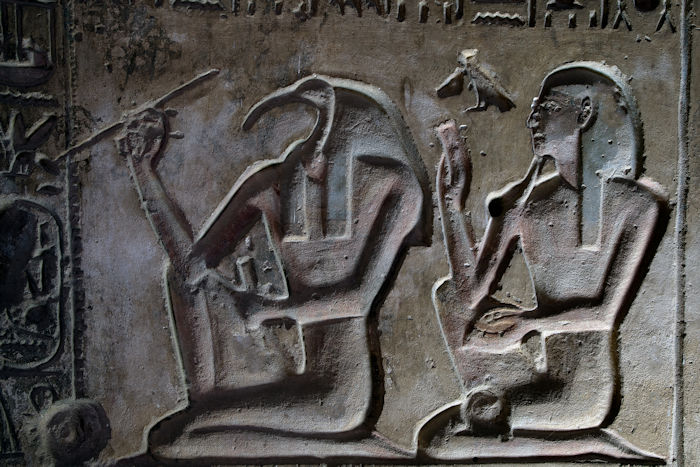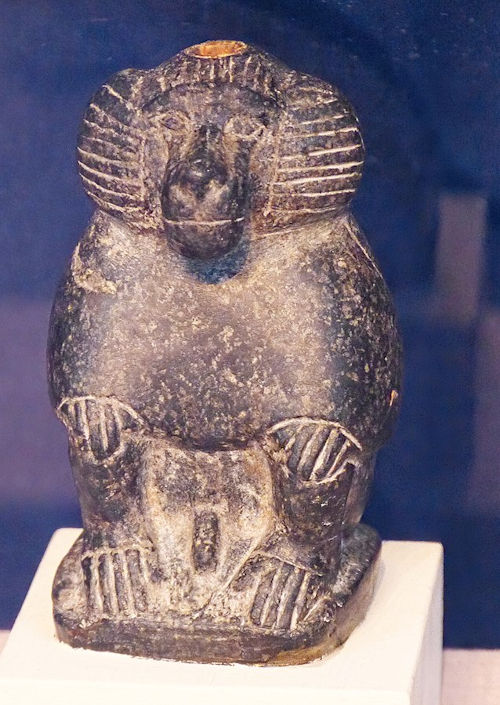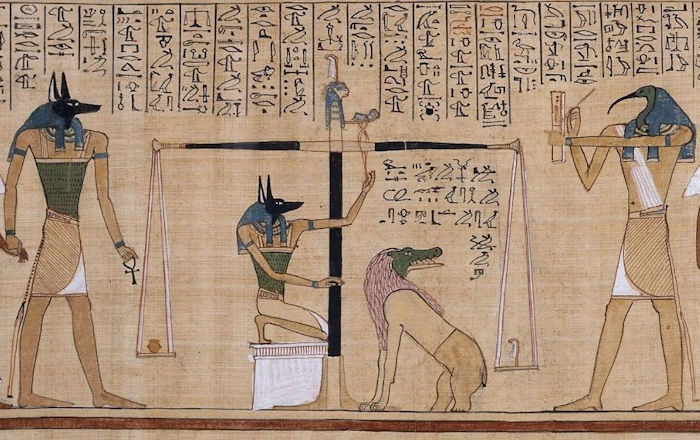Thoth: Ancient Egypt’s Most Mysterious, Highly Venerated God Of Knowledge And Writing
A. Sutherland - AncientPages.com - Egypt’s most mysterious and most interesting figure is the god Thoth (or Djehuty), as the Egyptians called him. This god was highly venerated in the Egyptian pantheon and had many names and titles.
Relief depicting the god Thoth in the Temple of Ramesses II at Abydos Middle Egypt. Credit: Adobe Stock - Ibrahim
Among numerous references to Thoth, there are late-period (700–323 BC) writings that describe him as a god, holding the heart and tongue of Ra and in the earliest writings of the ancient Egyptians such as The "Palermo Stone" versus "The Coffin Texts." This mysterious God was not considered as a god but a flesh-and-blood ruler and a divine teacher of humans, who left his most important legacy for them - a great library of knowledge and science.
Thoth - Egyptian God Of Science, Literature, Writing And Keeper Of Sacred Books
According to Plato and the translation of "The Book of the Dead" (Budge, E. A. Wallis, 1960), Thoth revealed to the Egyptians astronomy, counting, geometry, and writing. There are references to Thoth and his Atlantean origin.
Statue of God Thoth as baboon at the Penn Museum. Credit: Mary Harrsch - CC BY-SA 4.0
“The Americana: A Universal Reference Library” 1908 edition, writes that Thoth “…is the god of time and its divisions; he is the measurer and god of measurements.
He is the conductor of the dead.
He is also the god of human intelligence, to whom are attributed all the productions of human art . . . all the literature of Egypt is attributed to him—all the writings that relate to the different sciences, mathematics, astronomy, medicine, music.
Thoth is also credited with the invention of alchemy and magic…”
Scribes in ancient Egypt considered him as a role model.
They saw themselves as “followers of Thoth,” and in one hymn, there was a warning that the baboon – an earthly emblem of Thoth – always kept its eye on the scribes’ work to ensure that they were worked efficiently during their office hours.
As the god who oversaw all scientific and literary achievements, Thoth was in charge of “the sacred books in the “House of Life” ('Per-ankh'), such ‘houses’ were centers of knowledge run by priests in ancient Egypt, and several of them are known to have existed at Abydos, Memphis, Edfu, Koptos, Akhmim, Esna and Akhetaten.
The sacred books in the “House of Life” contained all collected scientific writings dealing with the wisdom of Egypt. Among them was also “The Book of Thoth,” forty-two papyrus scrolls with a great variety of subjects, which Thoth himself most probably dictated.
Four of the papyri of “The Book of Thoth” were devoted to astrology and astronomy. The rest of the book contained hymns to the great god Thoth and treatises on medicine, philosophy mixed with religious, ceremonial traditions. It remains a mystery that no copy of this remarkable book has ever been discovered, but many fragments of the “Book of Thoth” are mentioned in several other papyri. According to one theory, there was once a copy of this book at the Great Library of Alexandria but was lost in the fire, the 4th century AD.
Detail from the Papyrus of Hunefer (c. 1275 BCE) depicts the jackal-headed Anubis weighing a heart against the feather of truth on the scale of Maat, while ibis-headed Thoth records the result. Having a heart equal to the weight of the feather allows passage to the afterlife, whereas an imbalance results in a meal for Ammit, the chimera of crocodile, lion, and hippopotamus. Credit: Public Domain
It has also been proposed that the “Book of Thoth” or at least its copy is hidden in a concealed chamber in the vicinity or inside the Great Pyramid.
Thoth was worshiped at Hermopolis, which the Egyptians knew as Khmunu or Khemenu ("the City of the Eight") and the Greeks called it "the city of Hermes" because they associated Thoth with their god Hermes.
God Thoth Wrote A Mysterious Book
In his book "Ancient Egypt", George Rawlinson mentions a beautiful ancient legend about god Thoth who wrote a mysterious book, full of sacred wisdom and science, which told of everything concerning the birds of the air, and the fishes of the sea, and the four-footed beasts of the earth. This book was not easy to obtain.
“…He who knew a single page of the book could charm the heaven, the earth, the great abyss, the mountains, and the seas. Thoth took the work and enclosed it in a box of gold. The box of gold he placed within a box of silver, and the silver box within a box of ivory and ebony, and that again within a box of bronze; and the bronze box he enclosed within a box of brass, and the brass box within a box of iron; and the box, thus guarded, he threw into the Nile at Coptos. But a priest discovered the book's whereabouts and sold the knowledge to a young noble for a hundred pieces of silver, and the young noble with great trouble fished the book up.
But the possession of the book brought him not good but evil. He lost his wife; he lost his child; he became entangled in a disgraceful intrigue. He was glad to part with the book. But the next possessor was not more fortunate; the book brought him no luck. The quest after unlawful knowledge involved all who sought it in calamity…”
Updated on January 16, 2022
Written by – A. Sutherland AncientPages.com Staff Writer
Copyright © AncientPages.com All rights reserved. This material may not be published, broadcast, rewritten or redistributed in whole or part without the express written permission of AncientPages.com
Expand for referencesReferences:
Ford M. Necrominon - Egyptian Sethanic Magick
Budge, E Wallis (1904) “The Gods of the Egyptians”
Rawlinson G. "Ancient Egypt"
Manassa C. Imagining the Past: Historical Fiction in New Kingdom Egypt
Faulkner, Raymond O., (translator) "Ancient Egyptian Coffin Texts".
More From Ancient Pages
-
 Scythians Were Not Always Nomadic Warriors Of The Pontic Steppe In Black Sea Region
Archaeology | Mar 19, 2021
Scythians Were Not Always Nomadic Warriors Of The Pontic Steppe In Black Sea Region
Archaeology | Mar 19, 2021 -
 The 5,500-Year-Old Underground Rock Settlement With Illuminated Galleries In Ancient City Of Hadrianopolis, Turkey
Archaeology | Sep 18, 2023
The 5,500-Year-Old Underground Rock Settlement With Illuminated Galleries In Ancient City Of Hadrianopolis, Turkey
Archaeology | Sep 18, 2023 -
 Ancient Native Americans’ Encounter With The Star People – An Otherworldly Rescue?
Ancient Mysteries | Jul 20, 2021
Ancient Native Americans’ Encounter With The Star People – An Otherworldly Rescue?
Ancient Mysteries | Jul 20, 2021 -
 5 Most Common Misunderstandings About Evolution
Evolution | Jun 5, 2023
5 Most Common Misunderstandings About Evolution
Evolution | Jun 5, 2023 -
 On This Day In History: Astronomer John Couch Adams And The Discovery Of Planet Neptune – On July 3, 1841
News | Jul 3, 2016
On This Day In History: Astronomer John Couch Adams And The Discovery Of Planet Neptune – On July 3, 1841
News | Jul 3, 2016 -
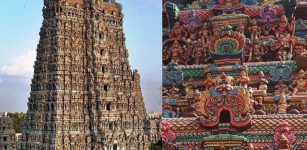 Meenakshi Temple Of Madurai Is Among Most Powerful Sacred Sites For Hindu People
Featured Stories | Apr 29, 2021
Meenakshi Temple Of Madurai Is Among Most Powerful Sacred Sites For Hindu People
Featured Stories | Apr 29, 2021 -
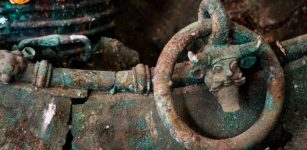 Mystery Of The Lavau Celtic Prince And The Beautiful Ancient Artifacts Hidden In His 2,500-Year-Old Tomb
Archaeology | Jun 5, 2017
Mystery Of The Lavau Celtic Prince And The Beautiful Ancient Artifacts Hidden In His 2,500-Year-Old Tomb
Archaeology | Jun 5, 2017 -
 Rare Gold Foils Found In Ancient Egyptian Tombs At Tel El-Deir In New Damietta
Archaeology | Jul 24, 2024
Rare Gold Foils Found In Ancient Egyptian Tombs At Tel El-Deir In New Damietta
Archaeology | Jul 24, 2024 -
 Thousands Of Mysterious Ancient Skeletons Discovered Near Vreta Abbey In Sweden
Archaeology | Sep 5, 2020
Thousands Of Mysterious Ancient Skeletons Discovered Near Vreta Abbey In Sweden
Archaeology | Sep 5, 2020 -
 Young Boy Discovers Rare Ancient Roman Treasure In Sussex, UK
Archaeology | Apr 15, 2024
Young Boy Discovers Rare Ancient Roman Treasure In Sussex, UK
Archaeology | Apr 15, 2024 -
 Ancient People In Tasmania Witnessed Stunning Auroras When The Earth’s Magnetic Field Flipped
News | Feb 19, 2021
Ancient People In Tasmania Witnessed Stunning Auroras When The Earth’s Magnetic Field Flipped
News | Feb 19, 2021 -
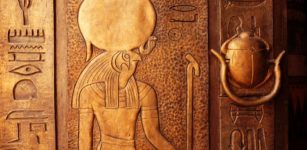 Sun God Ra Was Venerated In Every Age Of Ancient Egypt’s Long Dynastic History
Egyptian Mythology | May 3, 2021
Sun God Ra Was Venerated In Every Age Of Ancient Egypt’s Long Dynastic History
Egyptian Mythology | May 3, 2021 -
 Ancient Cave Church Complex In Basarabi, Romania
Civilizations | Dec 11, 2018
Ancient Cave Church Complex In Basarabi, Romania
Civilizations | Dec 11, 2018 -
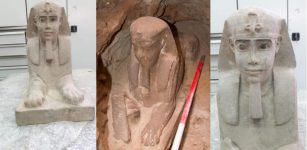 Sandstone Statue Of A Sphinx Discovered In Kom Ombo Temple
Archaeology | Sep 18, 2018
Sandstone Statue Of A Sphinx Discovered In Kom Ombo Temple
Archaeology | Sep 18, 2018 -
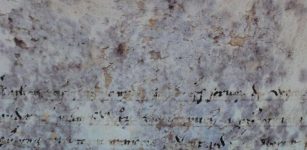 Part Of Secret Vatican Manuscript Decoded
Archaeology | Sep 7, 2017
Part Of Secret Vatican Manuscript Decoded
Archaeology | Sep 7, 2017 -
 On This Day In History: Fatal Fire Broke Out In Tre Kronor “Three Crowns” Castle, Stockholm, Sweden – On May 7, 1697
News | Dec 7, 2021
On This Day In History: Fatal Fire Broke Out In Tre Kronor “Three Crowns” Castle, Stockholm, Sweden – On May 7, 1697
News | Dec 7, 2021 -
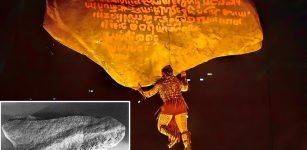 Undeciphered Singapore Stone’s Carvings – New Attempt To Crack The Puzzle
Artifacts | Jun 11, 2024
Undeciphered Singapore Stone’s Carvings – New Attempt To Crack The Puzzle
Artifacts | Jun 11, 2024 -
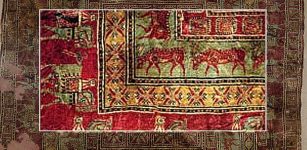 Pazyryk Carpet Found In Scythian Tomb Considered The Oldest Carpet In The World
Artifacts | Oct 5, 2016
Pazyryk Carpet Found In Scythian Tomb Considered The Oldest Carpet In The World
Artifacts | Oct 5, 2016 -
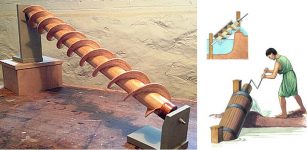 Archimedes’ Screw: Ancient Invention Used To Transfer Water To Higher Levels
Ancient History Facts | Aug 30, 2018
Archimedes’ Screw: Ancient Invention Used To Transfer Water To Higher Levels
Ancient History Facts | Aug 30, 2018 -
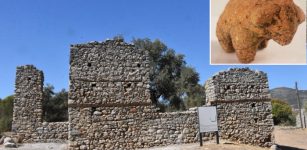 Children’s Toys Among Roman-Era Artifacts Unearthed At Ancient City Of Beçin Turkey
Artifacts | Oct 14, 2020
Children’s Toys Among Roman-Era Artifacts Unearthed At Ancient City Of Beçin Turkey
Artifacts | Oct 14, 2020

